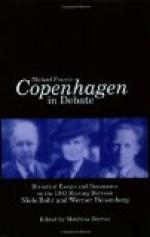|
This section contains 2,311 words (approx. 8 pages at 300 words per page) |

|
World of Chemistry on Werner Karl Heisenberg
Werner Karl Heisenberg is best known for his discovery of the uncertainty principle, for which he was awarded the 1932 Nobel Prize in physics. The uncertainty principle states that it is impossible to specify precisely both the position and momentum of a particle at the same time. The enunciation of that principle contributed to the understanding of a number of problems in atomic physics. It was also to have a profound effect on a far more general level, in that it essentially invalidated the long-held and fundamental scientific thesis of cause and effect. One of Heisenberg's first great accomplishments was the development of a new approach for solving problems of atomic structure, matrix mechanics.
Heisenberg was born in Würzburg, Germany, on December 5, 1901. His father, August Heisenberg, taught Greek philology at the University of Würzburg and ancient languages at the Altes Gymnasium (secondary school) of the...
|
This section contains 2,311 words (approx. 8 pages at 300 words per page) |

|


